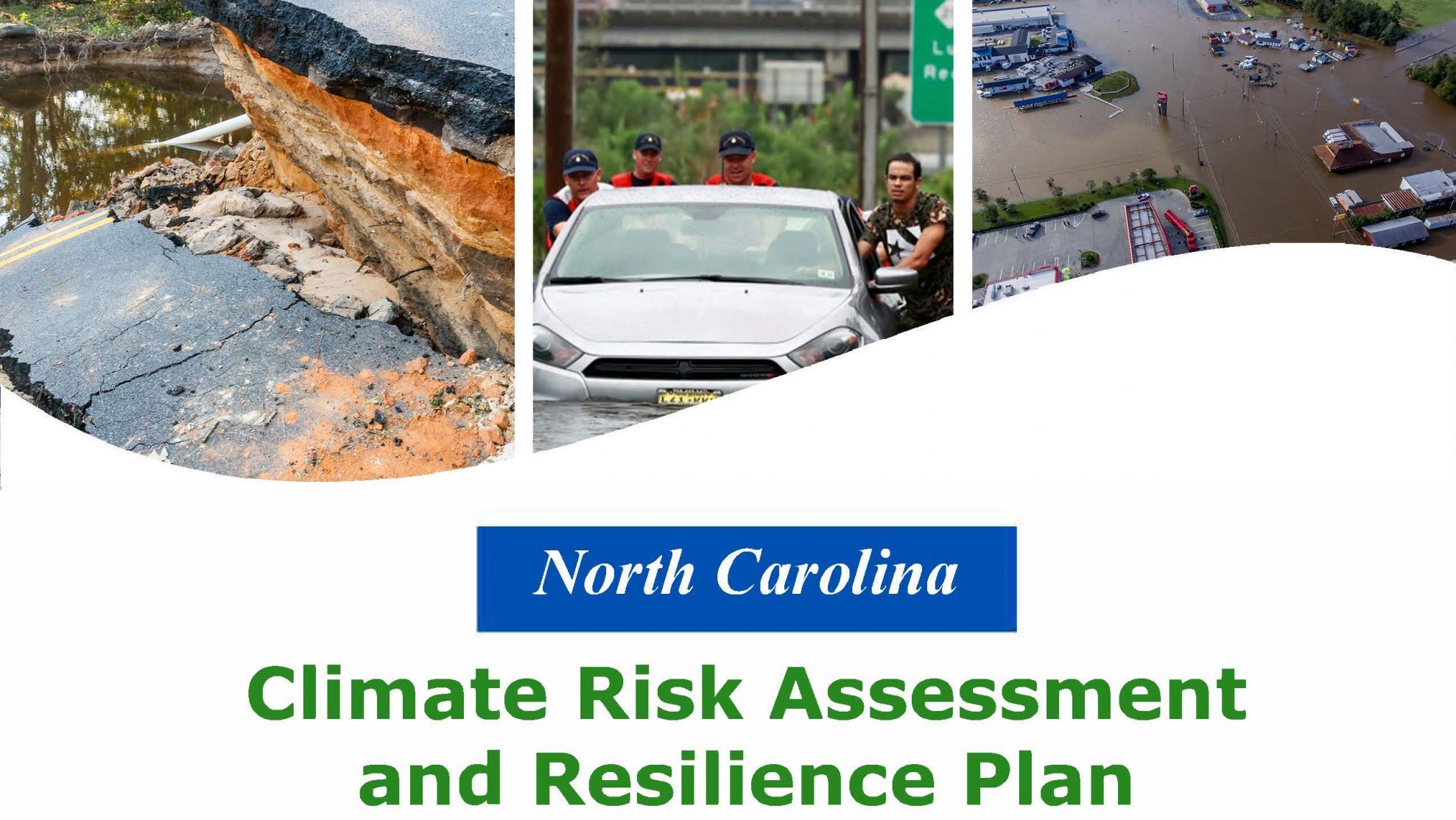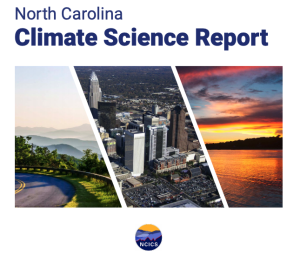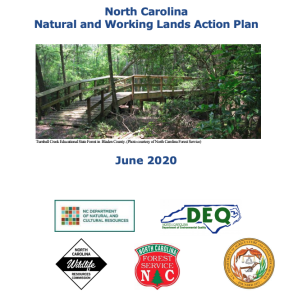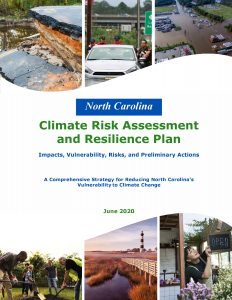North Carolina Climate Risk Assessment and Resilience Plan

The North Carolina Climate Risk Assessment and Resilience Plan is a comprehensive framework informed by scientists and stakeholders that intends to guide state action, engage policy-makers and stakeholders, and facilitate collaboration across the state of North Carolina. USGS Research Ecologist, Adam Terando; SE CASC Researchers, Lydia Olander, Sarah Spiegler, Katie Warnell; SE CASC Faculty Affiliates, Marcelo Ardon-Sayao, Jared Bowden, Kathie Dello, Christopher Galik, Madhusudan Katti, Gary Lackmann, Mark Megalos, Steve McNulty, Walter Robinson; and 2020-2021 Global Change Fellow, Tira Beckham were involved in the development of this extensive report.
The North Carolina Climate Risk Assessment and Resilience Plan aims to advance North Carolina’s resiliency to the impacts of climate change, aided by current efforts to limit the magnitude of that change by reducing greenhouse gas emissions and transitioning to clean energy sources. The report sets clear goals, creates a path for action, and provides standards for consistent evaluation of progress, to ensure that the resilient state of North Carolina thrives amid changing climate conditions and challenges.
 Appendix A of this report, the North Carolina Climate Science Report is summarized in chapter 3. This report was developed in response to Executive Order 80 (EO80), a commitment by the Governor of North Carolina, Roy Cooper, to address climate change in the state of North Carolina and transition to a clean energy economy. This report provides a scientific assessment of historical climate trends and potential future climate change in North Carolina under increased greenhouse gas concentrations. More specifically, the document includes an overview of the physical science of climate change, details the observed and projected changes in temperature and precipitation averages and extremes, and discusses hurricanes, large storms, sea level, and other climate metrics. These findings are presented both in a holistic view of the state and are also broken down into three regions – the Coastal Plain, the Piedmont, and the Western Mountains. Learn more about this report and view additional resources here.
Appendix A of this report, the North Carolina Climate Science Report is summarized in chapter 3. This report was developed in response to Executive Order 80 (EO80), a commitment by the Governor of North Carolina, Roy Cooper, to address climate change in the state of North Carolina and transition to a clean energy economy. This report provides a scientific assessment of historical climate trends and potential future climate change in North Carolina under increased greenhouse gas concentrations. More specifically, the document includes an overview of the physical science of climate change, details the observed and projected changes in temperature and precipitation averages and extremes, and discusses hurricanes, large storms, sea level, and other climate metrics. These findings are presented both in a holistic view of the state and are also broken down into three regions – the Coastal Plain, the Piedmont, and the Western Mountains. Learn more about this report and view additional resources here.
USGS Research Ecologist, Adam Terando, and SE CASC Faculty Affiliates, Kathie Dello, Gary Lackmann, and Walter Robinson, were on the author team of Appendix A and USGS Deputy Director, Ryan Boyles, was an external reviewer for the report.
 Appendix B of this report, the Natural Working Lands Action Plan was informed by the North Carolina’s Natural and Working Lands (NWL) stakeholder group led by the NC Department of Environmental Quality. This working group convened experts from academia, environmental and community NGOs, and state government agencies to develop recommendations for managing natural and working lands in the state of North Carolina to enhance carbon and resilience benefits. SE CASC Consortium PI, Lydia Olander and SE CASC Researcher, Katie Warnell led this initiative through the SE CASC project, Ecosystem Services Mapping Datasets. You can view the Data and Methods guide for this report and download datasets here. Additionally, you can explore a collection of Story Maps that examine how management of natural and working lands, including forests, wetlands, and agricultural land can enhance community resilience in North Carolina and help the state meet its greenhouse gas emissions goals here. These Story Maps show the magnitude and location of potential protection and restoration actions on community and habitat resilience as well as carbon sequestration and storage for North Carolina.
Appendix B of this report, the Natural Working Lands Action Plan was informed by the North Carolina’s Natural and Working Lands (NWL) stakeholder group led by the NC Department of Environmental Quality. This working group convened experts from academia, environmental and community NGOs, and state government agencies to develop recommendations for managing natural and working lands in the state of North Carolina to enhance carbon and resilience benefits. SE CASC Consortium PI, Lydia Olander and SE CASC Researcher, Katie Warnell led this initiative through the SE CASC project, Ecosystem Services Mapping Datasets. You can view the Data and Methods guide for this report and download datasets here. Additionally, you can explore a collection of Story Maps that examine how management of natural and working lands, including forests, wetlands, and agricultural land can enhance community resilience in North Carolina and help the state meet its greenhouse gas emissions goals here. These Story Maps show the magnitude and location of potential protection and restoration actions on community and habitat resilience as well as carbon sequestration and storage for North Carolina.
Appendix B, the Natural Working Lands Action Plan includes collaboration by SE CASC PI, Lydia Olander, SE CASC Researchers, Katie Warnell and Sarah Spiegler, and SE CASC Faculty Affiliates, Mark Megalos, Steve McNulty, Christopher Galik, Marcelo Ardon-Sayao, and Madhusudan Katti.
Full Report Download: North Carolina Climate Risk Assessment and Resilience Plan
Executive Summary & Key Findings
 Appendices
Appendices
Appendix A: North Carolina Climate Science Report
Appendix B: Natural Working Lands Action Plan
Appendix C: Mountain And Piedmont Regional Workshops Report
Appendix D: Coastal Regional Workshops Report
Appendix E: Glossary of Terms
Appendix F: List of Acronyms
Appendix G: Exposure Matrices
- Categories: